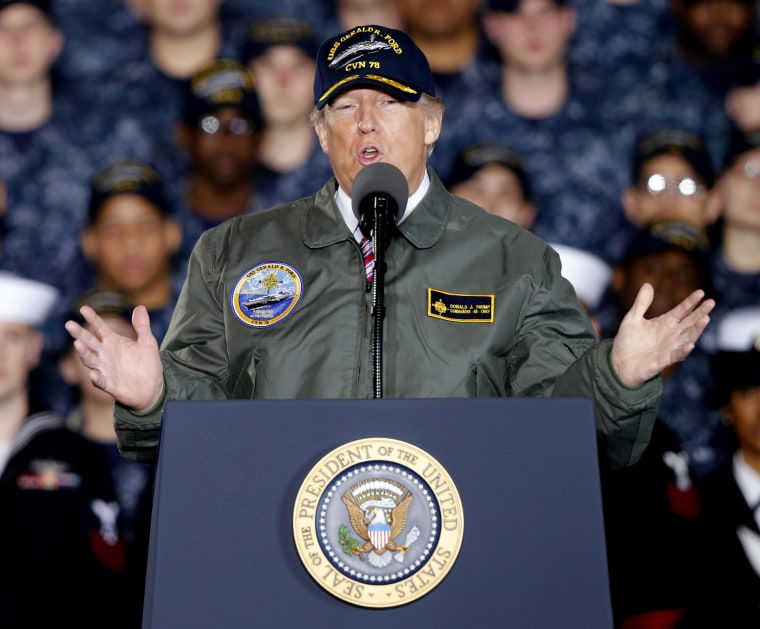During the Vietnam War there was a popular slogan: "Suppose they gave a war and nobody came?"
On Saturday, President Donald Trump posed a new question: Suppose the commander-in-chief declared a massive political scandal — and nobody cared?
In a series of early morning tweets, Trump claimed — with no evidence — that President Barack Obama personally ordered wiretap surveillance of Trump Tower and implied he might take legal action in response. He likened the purported scandal to "Nixon/Watergate" in scope and called his immediate predecessor a "bad (or sick) guy."
It was an explosive allegation that raised immediate questions about both the Obama administration’s behavior and the status of investigations into Trump associates' relationship to Russia, which the intelligence community has accused of a hacking campaign to aid Trump politically.
And then ... not much happened.
A little over an hour later, the president tweeted about Arnold Schwarzenegger’s ratings as host of "The Celebrity Apprentice" (the former governor announced this week he was stepping down, blaming Trump’s impact on the show's brand). Then he went to the golf course to hold meetings and perhaps, per his press office, "hit a few balls."
The White House didn't outwardly treat the president's public accusations against a former president as particularly urgent business either. As of Saturday evening, his staff had not put out any follow-up statements.
Obama spokesman Kevin Lewis said neither Obama nor any White House official ever ordered any surveillance of Trump or any U.S. citizen, but did not address whether such surveillance had occurred.
Related: Obama Spokesman Disputes Trump’s Wiretapping Claim
In ordinary times, such an accusation would send both parties and the White House scrambling into action with demands and counter-demands for an immediate investigation. But Trump is not an ordinary president and the initial response from his own side was so muted as to barely be audible.
Senate Majority Leader Mitch McConnell and Speaker Paul Ryan did not respond to requests for comment Saturday, although Ryan told Fox News on Friday that he did not think the Obama administration surveilled Trump's campaign aides.
In general, few Republicans of note mentioned the news. Sen. Lindsey Graham, R-South Carolina, who happened to be at a town hall in the morning, told his constituents he was disturbed by the allegations — but also by the possibility a judge had found legitimate cause for surveillance — and would look into the matter.
At around 4 p.m., Trump-skeptic Sen. Ben Sasse, R-Nebraska, issued a statement warning of "a civilization-warping crisis of public trust" and calling on Trump to show evidence to support his claims.
The other side didn't seem too compelled to respond either. Rep. Adam Schiff, D-California, the ranking Democrat of the House Intelligence Committee, called Trump’s claim "outlandish and destructive" in a statement.
House Minority Leader Nancy Pelosi, D-California, issued a single tweet calling Trump "Deflector-in-Chief" and reiterating her call for an independent commission. Senate Minority Leader Chuck Schumer, D-New York, gave no public comment at all as of Saturday evening.
What happened? They had seen this movie before. First, the president issues an incendiary claim. Then, a firestorm erupts. When the smoke settles, it becomes clear the president was making a charge without evidence to back it up, often by parroting a sympathetic commentator or a fringe supporter.
It happened on Trump's first full day in office after he claimed, against obvious photographic evidence, that his inauguration had attracted up to 1.5 million people.
It happened again when Trump argued, without any compelling evidence and against the word of Republican state officials around the country, that the election had been compromised by millions of illegal votes.
This was in keeping with Trump's repeated behavior during the campaign, like when he falsely linked rival Sen. Ted Cruz’s father to the JFK assassination, and before that, most famously his false theory that Obama was not born in America.
So on Saturday, everyone decided to skip the "firestorm" part and wait for the inevitable conclusion. So far, things are going according to that script.
Related: Supporters 'March 4 Trump' in Cities Across Nation
Trump’s tweets appeared to reference a Breitbart story that referenced commentary by radio host Mark Levin that referenced older unconfirmed reports describing FBI requests for FISA surveillance.
A senior official told NBC News Saturday morning that they and other officials had no idea what Trump was referring to in his tweet, and that the president apparently had not consulted with people inside the government who might know before tweeting.
The president’s past eruptions often followed a difficult news cycle. The current questions swirling around Attorney General Jeff Sessions, who had recused himself from any investigation involving the Trump campaign after failing to mention conversations with Russian Ambassador Sergey Kislyak, clearly fit the bill.
In short, it was business as usual. But the fact that this pattern had become so established, so normal, was on its own a shocking moment in American politics. It took 43 days into the Trump administration to arrive at this point.

